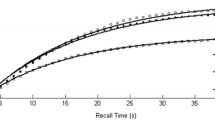Abstract
We examined the effects of ascending and descending patterns of success upon dysphoric and nondysphoric subjects' encoding, recall, and predictions of future success. In a 2 ×2 design, dysphoric and nondysphoric college students performed 45 trials of a dot-counting task under conditions of improving (ascending) or worsening (descending) patterns of success. Although patterns of success did not differentially affect dysphoric and nondysphoric subjects' encoding or recall, we found that dysphoric subjects were more negative than nondysphoric subjects in their predictions of success in the ascending condition but not in the descending condition. We discuss the implications of this result and possible underlying mechanisms. This research also allowed us to examine the normativeness (or “realism”) of dysphoric and nondysphoric subjects' encoding and recall, as well as to compare these two groups in their responsivity to immediate contextual information. These results are also discussed.
Similar content being viewed by others
References
Abramson, L. Y., & Alloy, L. B. (1981). Depression, nondepression, and cognitive illusions: A reply to Schwartz.Journal of Experimental Psychology: General, 110, 436–447.
Abramson, L. Y., Metalsky, G. I., & Alloy, L. B. (1989). Hopelessness depression: A theory-based subtype of depression.Psychological Review, 96, 358–372.
Alloy, L. B., & Abramson, L. Y. (1988). Depression realism: Four theoretical perspectives. In L. B. Alloy (Ed.),Cognitive processes in depression (pp. 223–265). New York: Guilford Press.
Beck, A. T. (1967).Depression: Clinical, experimental, and theoretical aspects. New York: Harper & Row.
Beck, A. T. (1987). Cognitive models of depression.Journal of Cognitive Psychotherapy, 1, 5–37.
Beck, A. T., Rush, A. J., Shaw, B. F., & Emery, G. (1979).Cognitive therapy of depression. New York: Guilford Press.
Carver, C. S., & Scheier, M. F. (1990). Origins and functions of positive and negative affect: A control-process view.Psychological Review, 97, 19–35.
Coyne, J. C. (1976). Toward an interactional description of depression.Psychiatry, 39, 28–40.
Coyne, J. C., & Gotlib, I. H. (1983). The role of cognition in depression: A critical appraisal.Psychological Bulletin, 94, 472–505.
Dykman, B. M., Abramson, L. Y., & Alloy, L. B., & Hartlage, S. (1989). Processing of ambiguous and unambiguous feedback by depressed and nondepressed college students: Schematic biases and their implications for depressive realism.Journal of Personality and Social Psychology, 56, 431–445.
Dykman, B. M., Horowitz, L. M., Abramson, L. Y., & Usher, M. (1991). Schematic and situational determinants of depressed and nondepressed students' interpretation of feedback.Journal of Abnormal Psychology, 100 45–55.
Jones, E. E., Rock, L., Shaver, K. G., Goethals, G. R., & Ward, L. M. (1968). Pattern of performance and ability attribution: An unexpected primacy effect.Journal of Personality and Social Psychology, 10, 317–340.
Kendall, P. C., Hollon, S. D., Beck, A. T., Hammen, C. L., & Ingram, R. E. (1987). Issues and recommendations regarding use of the Beck Depression Inventory.Cognitive Therapy and Research, 11, 289–299.
Krantz, S. E. (1985). When depressive cognitions reflect negative realities.Cognitive Therapy and Research, 9, 595–610.
Krantz, S. E., & Gallagher-Thompson, D. (1990). Depression and information valence influence depressive cognition.Cognitive Therapy and Research, 14, 95–108.
Markus, H. (1977). Self-schemata and processing information about the self.Journal of Personality and Social Psychology, 35, 63–78.
Markus, H., Smith, J. C., & Moreland, R. L. (1985). Role of the self-concept in the perception of others.Journal of Personality and Social Psychology, 49, 1494–1512.
Author information
Authors and Affiliations
Additional information
This research was supported by a Romnes Followship awarded to Lyn Y. Abramson. We would like to thank Steve Aquino, Karin Jacobson, Toni Morgan, Katherine Pytte, Kristin Skuldt, Jill Steele, and Chris Wiebusch for their assistance with data collection, and Judy Markgraf and Cris Virgin for their assistance in the preparation of this manuscript.
Rights and permissions
About this article
Cite this article
Dykman, B.M., Abramson, L.Y. & Albright, J.S. Effects of ascending and descending patterns of success upon dysphoric and nondysphoric subjects' encoding, recall, and predictions of future success. Cogn Ther Res 15, 179–199 (1991). https://doi.org/10.1007/BF01173013
Issue Date:
DOI: https://doi.org/10.1007/BF01173013




